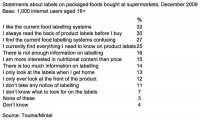 New research from Mintel highlights the importance of locally sourced food, with three times as many consumers caring about whether their food is locally sourced than whether it is organic. The research which looks in to labelling and things which consumers look for on packaging, finds today, as many as three in ten (29%) consumers say that whether a product is locally sourced or not is important to them, compared to only 10% who care about it being organic.
New research from Mintel highlights the importance of locally sourced food, with three times as many consumers caring about whether their food is locally sourced than whether it is organic. The research which looks in to labelling and things which consumers look for on packaging, finds today, as many as three in ten (29%) consumers say that whether a product is locally sourced or not is important to them, compared to only 10% who care about it being organic.
Consumers today believe that locally sourced products are more authentic, better quality and better for the environment due to lower emissions from transport. They are keen to help support local farmers and local food and drink industries – a particularly important factor during these times of economic hardship.
The labelling of food has become one of the key focuses of a wider drive to improve the diet of British consumers, through greater awareness of ingredients and nutrition.
Manufacturers of food are facing an unparalleled barrage of new mandatory and voluntary labelling requirements and guidelines, from health claims and production methods to origin.
However, signs are emerging of falling interest in, and confusion surrounding, nutritional labelling ahead of its mandatory front-of-pack application across the EU. Today, just a third of Brits (32%) like the current food labelling systems.
Overall, ethics and health top the ‘issues’ agenda, with men as, or more keenly, interested in locally sourced, fair trade or seasonal produce than women, who take the lead in free-range and health issues.
Their are significant differences in attitudes according to age. Older, educated and affluent shoppers show greater interest in food labelling but are often left confused, whilst younger consumers with less disposable income are fairly apathetic. Older consumers are more interested in healthy eating and prepared to pay more for healthy food than their younger counterparts, however, interestingly, they are less aware of recommended daily calorie intake.
An age split also emerges in attitudes towards date usage labelling, with older shoppers most likely to both ignore it and use produce past its sell-by date or look for food with a long shelf life.




Comments are closed.